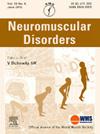蛋白质组学如何帮助阐明肌营养不良和相关多系统功能障碍的病理生理串扰?
IF 2.8
4区 医学
Q2 CLINICAL NEUROLOGY
引用次数: 0
摘要
基于质谱的蛋白质组学,基于自下而上或自上而下的生化方法,代表了系统生物学的核心分析技术,深深植根于病理生化研究的多组学领域。这次演讲的重点是如何利用大规模蛋白质组学调查来提高我们对复杂人类疾病(如杜氏肌营养不良)的分子和细胞机制的理解。蛋白质组学研究证实,DMD基因的遗传异常严重影响神经肌肉系统,细胞骨架肌营养不良蛋白异构体Dp427-M的缺失及其相关肌上皮糖蛋白复合物的减少会引发严重的肌纤维变性、慢性炎症和反应性肌纤维化。值得注意的是,肌营养不良症还具有多系统病理生理改变的特征,特别是影响中枢神经系统、心肺功能、肾脏和肝脏代谢。新建立的蛋白质组学生物标志物特征有可能增强对这些多系统异常的全面筛查,以及改善鉴别诊断、预后评估、治疗监测和系统地识别治疗杜氏肌营养不良症的新治疗靶点。预计未来肌萎缩症的整体筛选将包括多种组学类型方法的整体整合,包括组织蛋白质组学、单细胞蛋白质组学、亚蛋白质组学和生物流体蛋白质组学。本文章由计算机程序翻译,如有差异,请以英文原文为准。
01INVHow can proteomics help to elucidate the pathophysiological crosstalk in muscular dystrophy and associated multi-system dysfunction?
Mass spectrometry-based proteomics, based on both bottom-up or top-down biochemical approaches, represents a core analytical technique of systems biology that is deeply embedded in the multi-omics field of pathobiochemical research. This presentation focuses on the question of how large-scale proteomic surveys can be utilized to improve our understanding of the molecular and cellular mechanisms that underlie complex human disorders, such as Duchenne muscular dystrophy. Proteomic studies have confirmed that genetic abnormalities in the DMD gene severely affect the neuromuscular system and that loss of the cytoskeletal dystrophin protein isoform Dp427-M and concomitant reduction of its associated sarcolemmal glycoprotein complex triggers severe myofibre degeneration, chronic inflammation and reactive myofibrosis. Of note, dystrophinopathy is also characterized by multi-system pathophysiological alterations affecting especially the central nervous system, cardiorespiratory function, the kidneys and liver metabolism. Newly established proteomic biomarker signatures have the potential to enhance the comprehensive screening of these multi-system abnormalities, as well as improve differential diagnostics, prognostic evaluations, therapeutic monitoring, and the systematic identification of novel therapeutic targets to treat Duchenne muscular dystrophy. It is envisaged that the future integromic screening of muscular dystrophy would encompass the holistic integration of diverse omics-type methods, including tissue proteomics, single cell proteomics, subproteomics and biofluid proteomics.
求助全文
通过发布文献求助,成功后即可免费获取论文全文。
去求助
来源期刊

Neuromuscular Disorders
医学-临床神经学
CiteScore
4.60
自引率
3.60%
发文量
543
审稿时长
53 days
期刊介绍:
This international, multidisciplinary journal covers all aspects of neuromuscular disorders in childhood and adult life (including the muscular dystrophies, spinal muscular atrophies, hereditary neuropathies, congenital myopathies, myasthenias, myotonic syndromes, metabolic myopathies and inflammatory myopathies).
The Editors welcome original articles from all areas of the field:
• Clinical aspects, such as new clinical entities, case studies of interest, treatment, management and rehabilitation (including biomechanics, orthotic design and surgery).
• Basic scientific studies of relevance to the clinical syndromes, including advances in the fields of molecular biology and genetics.
• Studies of animal models relevant to the human diseases.
The journal is aimed at a wide range of clinicians, pathologists, associated paramedical professionals and clinical and basic scientists with an interest in the study of neuromuscular disorders.
 求助内容:
求助内容: 应助结果提醒方式:
应助结果提醒方式:


